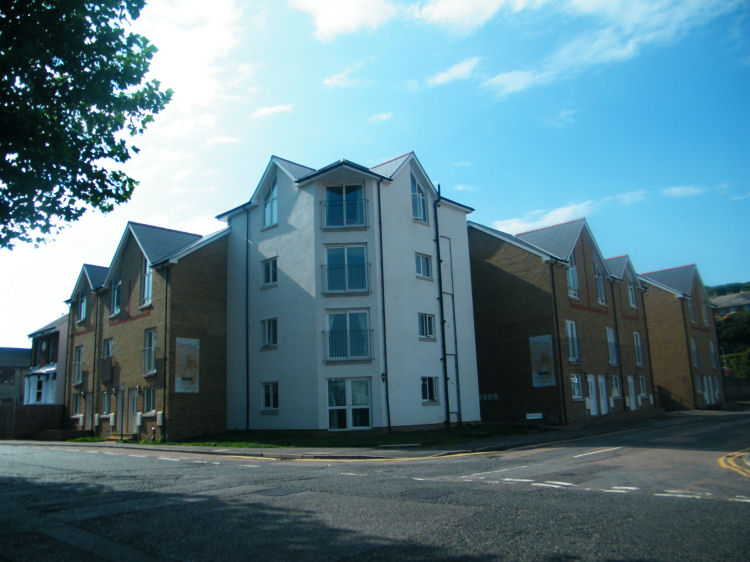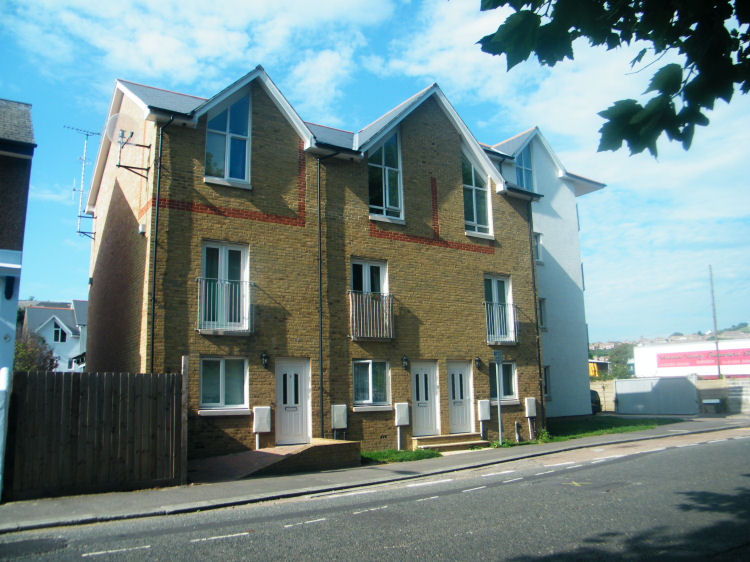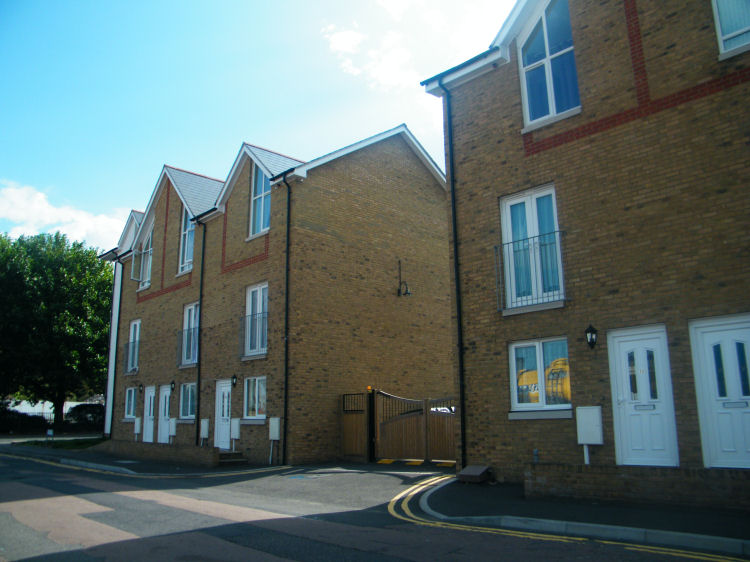|
30 Coombe Valley Road (30 (26) Union Road
  ) )
Bottom

Dover
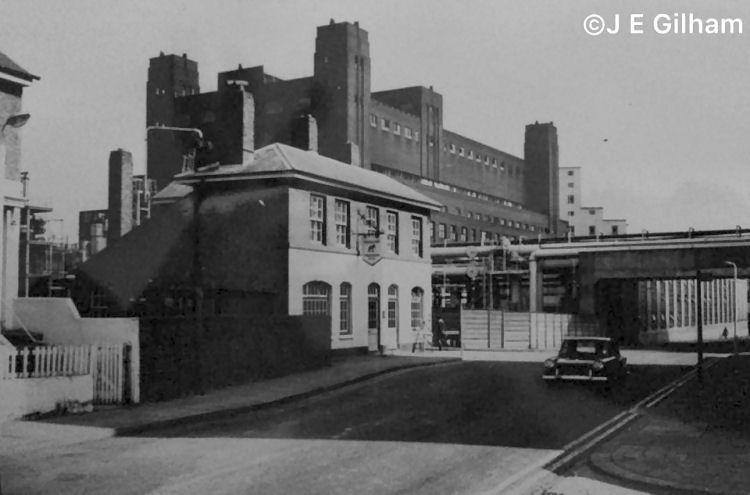
Above photo, 1972. |
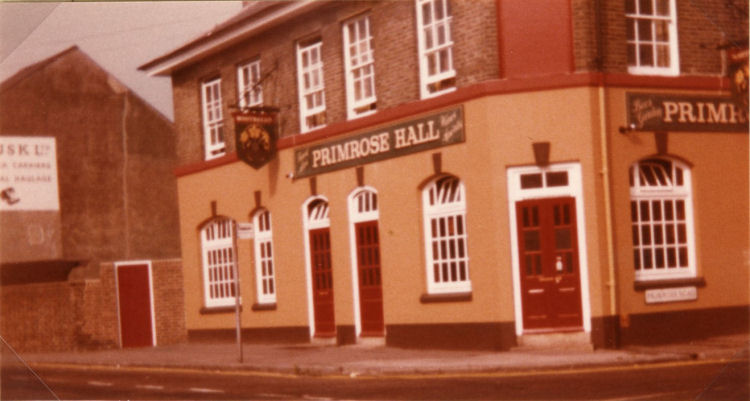
Above photo circa 1980 by Barry Smith. |
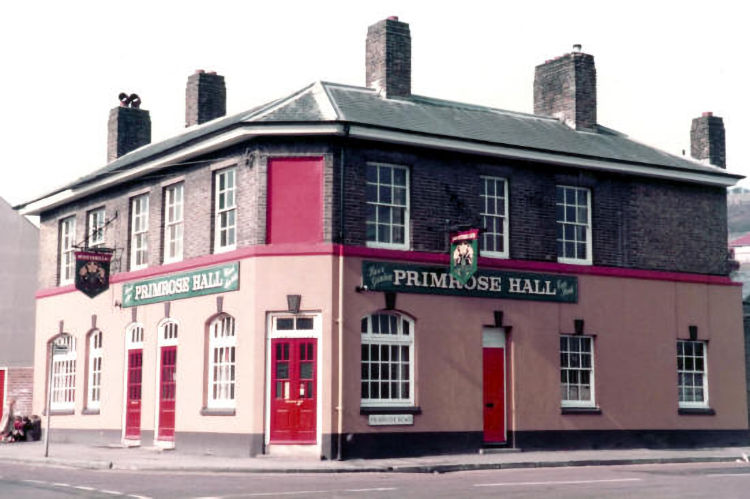
Above photo, 1983. Photo by Eddie Chard. |
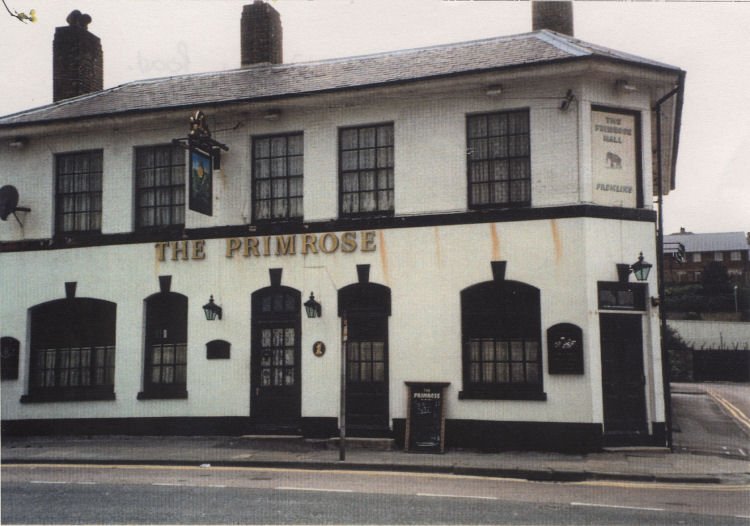 |
|
Photo above and below May 1995 |
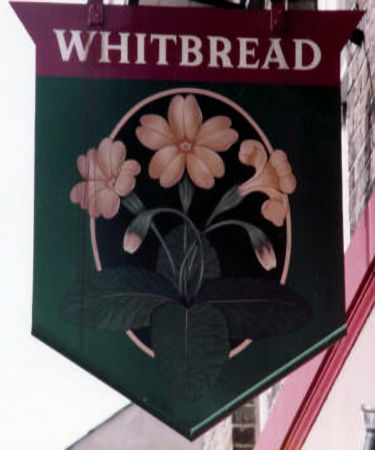 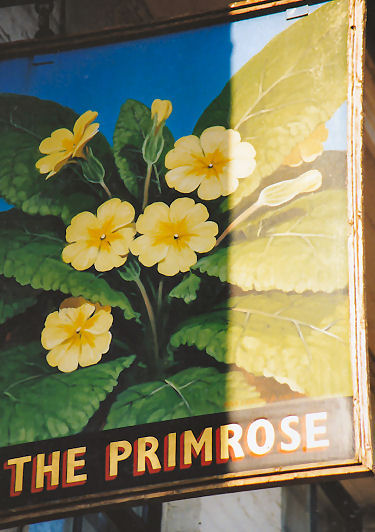
Primrose sign left, 1983, sign right August 1991.
Above with thanks from Brian Curtis
www.innsignsociety.com |
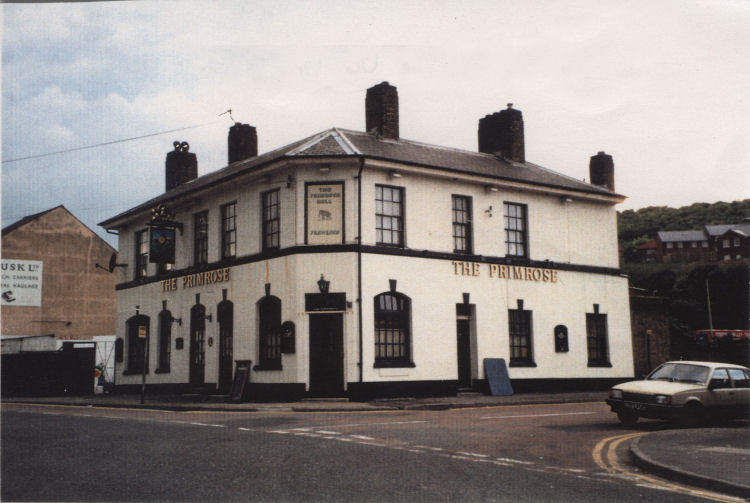 |
|
From the Dover Express and East Kent News, 17 January, 1936.
At the Dover Licensing Transfer Sessions, held on Friday last, plans
for alterations to the "Primrose Hall," Union Road were approved.
|
The sign was said to immortalise a soldier who was active in the Afghan
war.
An "Old Primrose Hall" also had its place in the road but it was part of
the road haulage industry. In 1874 the address was given as just "Bottom",
obviously referring to Buckland Bottom.
 In 1899 according to the Kelly's Directory, the
landlord John Court the pub was referred to "Primrose Hall, Public House and
carrier". The licensed property, known as "Primrose Hall",
occupied the corner with Primrose Road. The number would be different before
1901 but the site is the same. Present in 1857 and a new licence in 1864
suggests rebuilding or a fuller licence. In 1899 according to the Kelly's Directory, the
landlord John Court the pub was referred to "Primrose Hall, Public House and
carrier". The licensed property, known as "Primrose Hall",
occupied the corner with Primrose Road. The number would be different before
1901 but the site is the same. Present in 1857 and a new licence in 1864
suggests rebuilding or a fuller licence.
|
From the Dover Express and East Kent Intelligencer, 23
July, 1864.
APPLICATION FOR ADVICE
John Chatwyn, 73, a pauper in the Dover Union, applied to the Bench
for advice. He said he had left the Workhouse on Saturday for three days
leave. On the previous morning he went to the "Primrose Hall," Buckland,
to see his daughter, who was servant there. He indulged a little too
freely and got the worse for liquor, and the landlord then beat him most
cruelly.
Applicant, who still appeared a little worse for his indulgence,
entered into a long and rambling statement of his grievances, during
which he described the landlord's conduct as "anything but gentlemanly,"
but the Magistrates failed to see what charge he could sustain against
the landlord, and therefore advised him to go back to the Union and
endeavour to forget his indignities.
|
|
Dover Express, Saturday 30 July 1864.
To Correspondents.
Mr. David Brockman, landlord of the "Primrose Hall," Buckland, desires
us to state that the circumstances alleged before the Magistrates by
John Chatwyn, a pauper at the Union, to have taken place at "Primrose
Hall" on Sunday week, are altogether devoid of foundation.
|
|
From the Dover Express and East Kent Intelligencer,
10 December, 1864.
RIGDEN v. BROCKMAN
The defendant in this case is the landlord of the "Primrose Hall,"
Buckland and the complainant a labourer. It appeared that on the
previous Monday complainant was in Abbey Lane, Buckland, having been
engaged in removing some refuse from a yard close by. He went with a
horse and cart to fetch some chalk, and while loading his cart defendant
came along and after making him shoot the chalk out of the cart, struck
him, with a shovel and a whip. - Defendant did not deny the charge, but
pleaded that he had been aggravated by the complainants conduct towards
him. - The Magistrates fined defendant 5s. and the costs 17s. 6d., which
he paid.
|
|
From the Dover Express and East Kent Intelligencer, 16
March, 1866.
FRY v. BROCKMAN
The debt was one of £3 10s. for fitting up the bar of a public-house
and performing other builder's work at the "Primrose Hall," Buckland
Bottom, of which the defendant was Mr. Brockman, the landlord.
The defendant objected to £1 10s. 6d. of the account, the charge for
distempering the ceilings of the house. The house was built by Messrs.
Fry and Pepper for defendant's occupation, at the direction of the
brewer, Mr. A. Kingsford, to whom it belonged. The defendant had to fit
up the bar himself, but the distempering of the ceilings was part of the
building contract and should have been included in the original work. It
was found, however, that when he (defendant) wanted to get into the
house the ceilings were not distempered, and on his wife speaking to the
landlord about it, Mr. Kingsford directed her to tell Messrs. Fry and
Pepper (plaintiff at that time having a partner) to come and do it.
The plaintiff, in reply to his Honour, said that all the work
included in the contract was finished before the order to distemper the
ceilings was given. The building account had been settled long since by
Mr. Kingsford, and the defendant was justly liable for all that he was
charged. The distempering of the ceilings was not part of the contract.
The defendant then said he had a bill against the plaintiff, which he
produced.
The bill was handed to the plaintiff, who admitted owing the
defendant something in the shape of a set-off, but disputed the
correctness of some of the items.
Ultimately the further hearing of the case was adjourned till the
next sitting, to give the defendant an opportunity of pleading his
set-off in the regular way.
|
|
From the Dover Express and East Kent News, Friday, 31 August, 1877. Price 1d.
A LOVER OF WHISKY
Sarah Johnson was charged with conveying a bottle of whisky into the
Dover Union.
Mr. T. Fox prosecuted on behalf of the Dover Board of Guardians.
Elizabeth Caroline Jester, assistant matron of the Workhouse, said: The
prisoner was admitted to the house yesterday morning, about twelve
o'clock. From a communication I received, I went into the receiving ward
and searched the prisoner, and found the bottle of whisky produced,
concealed in her bed. The cork had been taken out, but I cannot tell
whether the contents had been touched. The bottle was not full. I asked
her where she got it from, and she made no answer.
Charles Henry Wellard, master of the Workhouse said the bottle produced
contained whisky. He did not give permission for its conveyance into the
House.
The Bench imposed a fine of 40s. and costs; in default a month's
imprisonment.]
Prisoner was then charged with stealing from the bar of the “Primrose
Hall, Buckland Bottom, one bottle of whisky, value 2s. 6d., the property
of James Pierce.
Prosecutor said the prisoner came into his house about eleven o'clock
the previous morning, and called for a half-a-pint of beer, which she
paid herself, standing at the bar to drink it. She said she was going up
to the Union. He went into the back kitchen and left her at the bar, and
when he came back she was coming from behind the counter, but did not
notice that she had anything. He told her that she had no business there
and had better get out. An hour or two afterwards someone wanted some
whisky, and then he missed the bottle from a shelf behind the counter.
It had been filled that morning and was quite full. He suspected the
prisoner, and went to the Workhouse to see the master. From there he
went to the Police-station, where he saw the bottle of spirits.
The finding of the bottle in the prisoner's possession was proved by Mr.
Wellard, and Caroline Jester, the assistant-matron.
The prisoner was committed to take her trial at the next Quarter
Sessions.
|
An attempt was made in 1886 to open another outlet at number twenty
three.
The necessary permission was not given and I impress upon the reader that
the number of that house will also have changed over the years.
|
From the Dover Express and East Kent News, Friday, 15 May, 1903. Price 1d.
A WOMAN HANGS HERSELF
On Saturday afternoon, the Borough Coroner, Sydenham Payn, Esq., held
two inquests in the Board-room of the Dover Union Workhouse, the one on
the body of Harriet Smith, who was found hanging in an outhouse at
Primrose Road, on Friday, and the other on the body of John Doughty, who
was found in an apparently dying state at Russell Place early on
Saturday morning.
The Coroner having opened the Court, the following were sworn on the
Jury: Messrs. Thomas Lefevre, Steven Ayres, George Ashbee, James Day,
John Chapman, John Court, Edwin Ladd, William Norris, Thomas Rickard,
Edward Prescott, George Blythe, Frederick Husk, Charles Ashdown, Henry
Meadows, and John Chapman. The Coroner having explained the facts of the
two cases, the Jury went to view the bodies, the one being in the
Workhouse and the other at Primrose Road. The following evidence was
given:
Anthony Smith, husband of the deceased, who appeared in a peculiar state
of mind, in reply to the Coroner, said first that he was a beggar, but
on being asked for a further description, said he was a pensioner of the
Royal Artillery, living at 4, Primrose Road. Harriet Smith was his wife.
He married her at Trinity Church in 1872. he believed she was 50 years
of age. He saw his wife alive last at ten o'clock on Friday morning.
They were in the living room. She gave him a penny to go round and get
himself half a pint, saying “Perhaps someone will come in and make it up
to a pint, and you can stop there.” He went with his penny to the
“Primrose Hall.” When he went home to tea about four o'clock he found
the back door tied with a string from the inside. He took out his knife
and cut the string, and then he saw a figure hanging there. He found his
wife hanging and cold. He said, “Poor soul, is dead enough.” She was
hanging from the roof. He sent Mr. Nash to go for a Policeman. Then Mr.
Husk came in and he cut her down. It was all within an hour or so. They
let her lay till someone came and looked at her.
Witness: What do you bring it in – Wilful murder?
Continuing his evidence, the witness said his wife had been to the
Police Court during the week. She said nothing to him about it, but he
knew all about it. She was fined, and she should have paid the money
that day. About eight months ago he paid a guinea for her. The fine this
time was £1, and she was given till that day or Monday to pay it. It was
the worry that was the cause. She had been knocked about with other
women. When he went down to the “Primrose Hall,” he left her in the
house alone.
Charles Nash, a mariner, living at 5, Primrose Road, said: About 2.30 on
Friday a grocer boy came to his house, and could not get in at No. 4. I
told him to try the back door. He could not get in there, and I took the
things in. Mr. Smith came up at a quarter to four. I told him that the
front door was locked and that the back door tied with a string. He took
his knife out and cut the string. He did not go in, but he called me.
There was a chair there capsized, and I saw Mrs. Smith hanging. I did
not cut her down because I thought she had been dead for hours. I had
noticed that there had been a curtain put to the window to prevent
anyone looking in. I noticed that about eleven o'clock, but I did not
think anything. I had not seen the woman that day. She had been queer in
her talk for the last few days. She has been queer in her heart for a
long time. She used to talk of changing her mode of life, and turning
over a new leaf. She was very queer. That was before the Police
proceedings. She was locked up on Monday night. After we found the body
I went out to find a Policeman at the top of Cherry Tree Avenue. I did
not see anything after. I saw her on Thursday, and she was very low in
spirits.
George Husk, carrier, of 24, Union Road, said: I was called to Smith's
house about five o'clock, and I found Mrs. Smith hanging by a cord to
the roof of the wash-house. I can not say whether her feet were clear of
the ground, for I had my knife ready and cut her down as soon as I went
in. She was cold, and must have been hanging there some hours. I have
known her for years, and she owed me a little.
Police-constable W. E. Husk said: About 4.30 I was on duty in Cherry
Tree Avenue, when the witness Nash came to me, and from what he said I
hurried on to the house. I found the body lying in the wash-house,
nearly cold. This piece of cord lay under her neck, and a similar piece
was attached to a rafter above. This handkerchief was tied over her
mouth and fastened behind. There was part of the string left which tied
the door. The body was left till the doctor came. I found nothing in the
room, and her husband said she could not read or write.
Dr. Ormsby said that he was called to see the body in the wash-house.
She must have been dead some hours. There was a deep mark on her face
from the rope. Her face presented the appearance of strangulation, which
no doubt was the cause of death.
The Jury returned a verdict that she hung herself during a period of
temporary insanity.
|
|
Dover Express, Friday 12 February 1904.
Bribery prosecutions.
For prosecution of Norris, Yeoman, Dale, and Mrs. Rhodes. The
magisterial hearing took place on Friday of
the charge of bribery at the November election last year in the Castle
Ward, brought on the information of
the public prosecutor against George Yeoman, barber, 5, Tower Hamlets
Road; William Norris, of the "Primrose Hall Inn," Union Road; James Dowell, of 44, Union Road, canteen
keeper at the Dover Gasworks;
and Mrs. Elizabeth a. Road, Landlady of the Imperial crown, 46, Tower
Street. The magistrates were Mrs. T.
A. Tourism in the chair, f. G. Right, B. Hills, P. W. J. Mackenzie, And
captain r. K. Mr. T. Matthew appear to
prosecute, directed by the Treasury. Mr. C. F. Gill, k. C., Appeared for
the defence, with Mr. Thawne Drury.
The charge against him was taken first. He was charged, on the
information of Mr. Seaward p.s., of
treasury Chambers, Whitehall, solicitor, with having been guilty of
wilful and corrupt Bribury at the
municipal election of the Castle Ward, Dover, by giving to W. H.
Diamond, Jacob Whitby Parade Hambrook,
John matcham, Stephen Tucker, Richard Doyle, Richard Gibbons, and Thomas
Langley, two shillings each,
and with promising 2 shillings to F3 double denim, to induce them to
vote at the election on November 2nd,
1903. Mr. Theobald Mathew said that he had been instructed by the public
prosecutor to appear in support
of the for someone's is with which the bench had to deal. They were
summonses charging the defendants
with bribery at the election in November last at the election of Mrs.
Lewis and Walmsley, in respect of which
a petition alleging bribery was lodged by Mr. G. Chitty, Upon which
petition the learning commissioner
found that they had been bribery, and the election was invalidated. It
will be well to read the section of the
act under which the proceedings were taken. It was contains in the third
schedule of the municipal corrupt
and illegal practices prevent station at, 1884, vol. 47, 48,. 70, Which
was a repetition of the section of the
corrupt practices prevention act, 1854, which ran in effect that every
person who should directly or
indirectly, by himself boy or by any other person, give, promise, or
lend any money or valuable
consideration to any photo or any person on behalf of any voter, in
order to induce any person to vote or
refrain from voting, or correctly give money as a reward in respect of
any such voting afterwards should be
guilty of the practice of bribery. There were us to offences specified
giving money to induce a vote of the
vote, and giving money as a reward after voting. There was no need to
prove that the money was given in
consideration of the voter having voted for any particular person, or
otherwise. The vote is the only matter
one had to deal with. That was the offence, and he should submit in
respect of these four defendants, if
there was one Prime of facie case proved, the charge was made out of
Tanks the defendant in question. The
first he would take would be that of George Yeoman, it was alleged to
have bright10 person's. He was a
barber apparently in a humble position of Life. He's second defendant
what was James Doyle, who was a
man in a very humble position of Life, earning 23 shillings a week, who
was said to have 5 persons. The last
was Mrs. Rose, Who was also a publican, who was alleged to have brought
three persons. If the banks
thought a primary facie case was made out, then it would be their duty
to send a defendants for trial.
MORE TO ADD.
|
|
From the Dover Express and East Kent News, Friday, 12 February, 1904. Price 1d.
DOVER LICENSING SESSIONS
Mr. Rutley Mowll said that in reference to the “Primrose Hall,” he had
to apply for the renewal of this licence to Mr. J. Goldsack Chapman, who
had entered into possession of the premises, the outgoing tenant having
yielded over and given up possession of the premises, and Mr. Chapman
having taken them in his stead. He would call Mr. Chapman to prove these
circumstances. He had made a suggestion to Mr. Bradley, who appeared on
behalf of Mr. Wright, who was opposing the renewal of the licence to Mr.
Norris, that as the renewal was being applied for to another tenant, his
objection would probably not continue, but he said that he was of
opinion that this application ought to be adjourned. He was sorry to
have to disagree with his friend., although professionally he had to do
so – (laughter) – very frequently, but he had to point out that it was
very inconvenient, and that therefore he must make the application, and
that therefore he must make the application at the present time.
John Goldsack Chapman said that he had carried on business at Primrose
Road as a carrier. Mr. Norris, the old tenant of the “Primrose Hall,”
gave up possession of his premises to witness that morning, and he had
entered into possession, and now applied to the Magistrates for the
renewal of the licence. He had previously kept the “Milestone Inn” 5½
years.
By Mr. M. Bradley: He was aware of the circumstances under which Mr.
Norris was leaving. He was not aware that there was to some extent a
cloud over the licence at the present moment.
You have been advised before taking this?
No, sir.
I think it would be rather well if you were advised. Do you not know the
reason why Mr. Norris is leaving?
No, sir.
Mr. Bradley: You know very little.
The Chief Constable was then called, and stated that the applicant held
the licence of the “Milestone,” leaving in 1890, and was well known to
him. He considered him a proper person to hold a licence.
The Mayor: I suppose, Mr. Knott, the “Primrose Hall” has a clean sheet?
Yes, sir.
Mr. J. G. Sandiford said that on January 23rd he served notice of this
change on Mr. W. J. Barnes, and Overseer, and Chief Constable Knott.
Mr. M. Bradley said that this was an opposition to the renewal of the
licence of the notice which had been served to Mr. William Norris
because Mr. W. Norris was the licensee according to the register of
licences in respect to these premises. His application to the
Magistrates would have been, as it was still, that they should adjourn
over the hearing of this case, because there were other proceedings
pending which effected not only Mr. Norris, the licensee, whose name
appeared on the books, but also, he would submit, the house itself. The
grounds upon which he made the application were these. It was perfectly
known that certain proceedings had taken place, and upon these
proceedings before the Commissioner there would be a report, and that it
was the absolute duty of the Director of Public Prosecutions to lay the
report, so far as relating to any offence committed at a licensed house
before the Licensing Justices.
The Mayor: That has been done.
Mr. Bradley, continuing, said that it was to be recorded on the register
of licences, and taken into consideration by the Magistrates. At the
time the notice was issued that had not been done. He understood that it
was quite recently – he presumed only on Saturday, because his enquiries
were up to Saturday. His application was that pending the hearing of
other proceedings, which were still in abeyance, this matter should have
been left over until the adjourned Sessions and then the whole of the
facts taken into consideration by this Bench, and this application then
considered. It appeared to him, and he did not want to go into the whole
of the facts, that the offences alleged were alleged to have taken place
actually on licensed premises, and if licensed premises were used for
the purpose of the commission of an offence against the law, his
application was to adjourn it till the adjourned Licensing Sessions,
when all the other questions now pending would be settled.
Frederick William Bartholomew proved the service of the notice of
objection on the licensee.
The objections were then read by the Magistrates' Clerk. They were
signed by Thomas William Wright, Secretary of the Dover Temperance
Council, and the grounds of the objection were “that you have knowingly
suffered bribery and treating in regard to the Municipal Elections of
1903, to take place on your licensed premises; 2nd, that you were the
person guilty of bribery at such election; and, 3rd, that the licence is
not needed by the requirements of the neighbourhood.
Mr. Mowll; Are you going to call any evidence?
Mr. Bradley: That is my application.
In reply to further questions by Mr. Mowll. Mr. Bradley said that if the
adjournment was not granted that would be his case.
Mr. Mowll said that he objected to the adjournment.
The Mayor: The Magistrates have decided not to adjourn. (Loud cheers.)
Mr. Mowll: Now he is going on with the opposition.
Mr. Bradley: No I am not, after this.
Mr. Mowll, to the Magistrates: Then you have no evidence before you.
The Magistrates said that the licence would then be renewed to Mr. J. G.
Chapman.
|
|
From the Dover Express and East Kent News, Friday, 9
March, 1906. Price 1d.
ALTERATIONS TO PUBLIC HOUSES
At the Police Court this morning, Mr. A. K. Mowll asked permission of
the Bench to make alterations to the structure of several public houses.
At the "Primrose Hall," it was proposed to build a bar parlour, and
to enlarge the club room at a cost of £300. the Chief Constable had seen
the plans and had no objections.
The Magistrates approved of the various plans showing the
alterations.
|
|
From the Dover Express and East Kent News, Friday 1 March, 1907. Price 1d.
FATAL FALL WHEN PLAYING - A LITTLE GIRL'S SAD DEATH
An inquest was held at the “Primrose Hall Inn,” Union Road, yesterday
afternoon by the Borough Coroner (Sydenham Payn, Esq.) to enquire into
the circumstances attending the death, as the result of a fall, of a
little girl aged between 5 and 6, the daughter of one of the Dover gas
Company's employees. Alfren Bonnage, of 19, Union Road.
Mrs. Fanny Elizabeth Bonnage, wife of Alfred Bonnage, said: The deceased
was my little girl Margaret, aged 5 years and 9 months. She had always
been in good health till five weeks ago. Then she was out in the garden
playing with a pair of perambulator wheels in company with two younger
children, cousins. She got on to the wheels and fell off and cut her
head. I went out when I heard crying, and she said she had hurt her head
at the back. I took her indoors and bathed the head, cutting the hair
away from the wound. Next day the place gathered, so I called Dr.
Baird's attention to it. He told me to poultice it and I did so. It
discharged, and then got better and healed up. Afterwards she seemed to
be all right for about a month, and used to run about and playas usual.
A fortnight ago tomorrow she was taken bad. She seemed bad a feverish
and as Dr. Baird was attending at the house I spoke to him and he has
attended her every day since. She got worse and last Monday the doctor
gave no hope. She became unconscious on Sunday and did not speak
afterwards. Before that all she complained about was the pain in her
stomach. I took her up to bed last Sunday, intending to keep her there,
and then she trembled and became unconscious. She died yesterday at 20
past 2.
The Coroner: Have you lost any children before?
Witness: Two little boys from bronchitis.
By the Jury: It was asphalt she fell upon.
Dr. John Baird said: I was attending the deceased's little brother for
influenza about five weeks ago, when I was shown the wound in the little
girl's head as described by Mrs. Bonnage. It was a slight cut. It
gathered afterwards and discharged for quite a week. It healed up in the
ordinary way, and I did not see the child as a patient for a fortnight
or so. Then Mrs. Bonnage called my attention to the child. It was
feverish, and the pupil on one of the eyes was enlarged. The child got
worse and it became unconscious and then afterwards paralysed and could
not move and died paralysed.
Death was caused by meningitis set on due to the injury.
You don't think it was a question of scarlet fever?
Not the slightest question of it. The child died from the ordinary
symptoms of acute meningitis. Probably a splinter of bone pressed upon
the membrane of the brain. No operation was possible.
The Coroner questioned if it was not unusual for so long an interval to
have elapsed before the child became ill.
Witness said that meningitis would not occur until the wound healed.
The Jury returned a verdict that death was due to the accident in
accordance with the medical evidence.
|
|
From the Dover Express and East Kent News, Friday, 23 July, 1915. Price 1d.
TERRIFIC PUBLIC HOUSE ROW
At the Dover Police Court on Monday, before Messrs. M. Pepper (in the
chair), Edward Chitty and H. Hobday.
Private Henry Stone, Private George Stone (brothers), and Private George
Wilson, were charged with, on Saturday evening last, being concerned in
doing wilful damage to window blinds and a quantity of glasses, the
property of William Norris, landlord of the “Primrose Hall,” public
house; George Stone was further charged with assaulting P.C. Griggs by
striking him in the face whilst in the execution of his duty in Union
Road, Dover; Henry Stone was further charged with assaulting P.C. Turner
whilst in the execution of his duty in Lorne Road; George Stone was
further charged with assaulting Arthur Thomas Brockman, labourer, Coombe
farm, in Union Road, and also with assaulting Robert Bailey by striking
him in the face, in the “Primrose hall,” public house.
The three prisoners pleaded not guilty. George Stone said that he
remembered nothing about it; his brother said he did not recollect
leaving the “Primrose Hall.” He might have assaulted P.C. Turner.
Lilian Norris, daughter of William Norris, landlord of the “Primrose
Hall,” public house, 30, Union Road, said that on Saturday night, about
8.30, she saw the three prisoners pass by her window and go into the
bar. There was a disturbance not many minutes later, and she rushed into
the bar. The men were knocking everything over, and she saw them hit
Bailey. They tore the blinds down and broke glasses, and were also using
very bad language. She asked them to leave, but they took no notice.
They remained until nearly nine o'clock. She telephoned to the Police
Station three times, and they replied that they were trying their best
to get men there. At about five minutes to nine she called “Time!” and
so got the men away. They were not drunk, but had been drinking. She
thought that they must have done it for “devilment.”
William Norris, landlord of the “Primrose Hall,” public house, said he
was in the bar on Saturday evening at about 8.30, when the prisoners
came in. They called for and were served with three glasses of beer.
They were not the worse for drink. One of the Stones drank a part of his
beer and threw the rest in Brockman's face. Of course that caused a
little trouble. Witness tried all he could to get them out of the place,
and he “rang up” the Police. The blinds were torn down and the glasses
broken. The two Stones were billeted opposite witness's stables. The
Stones said they did not care if he rang for forty Police. Witness,
addressing the Bench, asked the Magistrates to deal leniently with the
men.
Arthur Thomas Brockman, labourer, who was suffering from a black eye,
said he was in the bar when the prisoners came in. He went out the back,
and on his return the prisoners, whom he did not know, were fighting
with a man named Bailey. After they had done with him, witness sat down
on a seat, and George Stone threw the beer in his face and came for him.
He struck witness in the eye and by the jaw. Henry Stone then came and
smacked his face, and Wilson then hit him “properly, and I did not know
where I was. I had not said a word to them.” They then left and went
down the road.
Robert Bailey, whose left eye had been very badly blackened, and the
right eye slightly, and whose face had been stitched up, said that he
went into the bar on Saturday evening and found the prisoners there.
Everything was quiet, and he called for “a two of beer,” and was served.
He picked up his beer and was going to drink it when it was knocked out
of his hand, and he himself was knocked up into the corner by George
Stone. He got up, and the three went for him.
The Chairman: Brave men; three against one!
Prisoner George Stone: I am sure I never hit a man “coward” in all my
life.
Police-constable Griggs said that he was on duty in Union Road on
Saturday night at 9.10 when he saw the three prisoners come down the
road. They were using obscene language and causing a disturbance. He
asked them to be quiet, when the prisoner George Stone struck him in the
mouth and knocked him down. Before he could get up the prisoner Henry
Stone knocked him down again. He then blew the whistle, and whilst
blowing it one of the Stones struck him in the mouth, breaking off two
teeth. P.C. Turner then arrived and the prisoners made off towards Lorne
Road. Witness followed Turner after them. He found George Stone being
held by civilians, who saw the previous occurrence. He handcuffed hem.
Obtained the ambulance, and brought him to the Police Station. In the
scuffle his (witness's) helmet badge was broken. George Stone used
filthy language on the way back to the Police Station. He put him on the
ambulance because he did not want to be kicked by him – not because he
was drunk, although he had been drinking.
All three prisoners said that they remembered nothing about the matter.
Police-constable Turner said that on Saturday night, from instructions
received, he went to the “Primrose Hall” public house, where he saw Mr.
Norris, who complained that three soldiers had been there creating a
disturbance and doing damage. He wished to charge them. He went in
search of the prisoners. On going down Union Road he heard a Police
whistle. He found the prisoners in Lorne Road. Henry Stone turned round
and struck him in the chest, knocking him aside. He closed with him and
handcuffed him. He then brought him to the London Road and handed him to
the picket. Witness then went back and saw Wilson and arrested him, and
handed him also over to the picket. He then went to assist P.C. Griggs
with George Stone, and they brought him to the Police Station on the
ambulance. George Stone's conduct was disgraceful all the way. He also
had threatened witness with a bayonet “when he comes out.”
Chief Constable Fox said that there was another witness if the Bench
wished to hear him who could give evidence as to the assault on the
Police.
Prisoner George Stone said that there was an argument about recruiting,
and after that he did not know what happened.
Wilson said he had had a drop of drink, and he remembered nothing about
it.
Chief Constable Fox said that he was at the Police Station when the two
Stones were brought in and their faces were smeared with blood and they
complained of having been struck by men of the Royal Fusiliers. They
appeared to be practically mad, and they seemed to be quite out of their
senses. Although George Stone was handcuffed it took several men to
restrain him. Wilson was brought to the Police Station later, having
been taken down the Shaft by mistake. He (Chief Constable Fox) did not
know that Police-constable Griggs was assaulted by all three prisoners,
but Wilson was only charged with doing damage.
Mr. Chitty asked prisoner George Stone what time he went to the
“Primrose Hall.”
Prisoner answered that they had several drinks at home. He thought it
must have been getting on for nine o'clock, but he did not know
properly.
The Chairman announcing the decision of the Bench, said@ George Stone,
you are the worst of the lot – three months' imprisonment with hard
labour, at Canterbury; Henry Stone, two months', for you are not quite
so bad; Wilson, we let you off with a month, and mind you do not get
into bad company again.
Mr. Chitty: You know that all three of you have disgraced your uniforms.
Your defences, like so many others are public house offences, and were
more or less due to drink. We have no evidence except your own that you
were drunk, and in fact the evidence is that you were not drunk. Why do
you not all three, now that you have the time, think it over and give up
the drink and behave yourselves like decent men and do credit to your
uniforms.
George Stone: We are trying to do credit. When we got to the “Primrose
Hall” we started talking about recruitment and a civilian started making
nasty remarks.
“Three months do not trouble me” remarked the prisoner George Stone as
they were being led away to the cells.
The Chairman of the Bench then called Mr. Norris, the landlord of the
house forward and commenced to speak to him.
“My dear sir,” interrupted Mr. Norris, at which the Chairman told him
that the Magistrates wished him to be careful of what he was up to in
future.
Mr. Norris: I am careful. When such men come into the house it is not my
wish and I do not want my daughter and wife insulted in the way they
were.
Mr. Chitty: be more careful in the way you give your evidence. You gave
it in the most extraordinary and improper manner. Mr. Norris replied
that he had conducted his house without trouble for years and during the
whole of the months that soldiers were billeted in the neighbourhood he
had no trouble. “I never had a coarse word or a bad word.”
Mr. Chitty: The Bench do not want you to address them, but they called
you back to caution you and tell you you had given your evidence in a
very unsatisfactory manner. I hope you will remember it.
|
|
From the Dover Express and East Kent News, Friday, 3 December 1915.
At the Dover Police Court this (Friday) morning, before Dr. C. Wood (in the
chair) Messrs. W. J. Palmer, A. Clarke, and H. Hobday.
Mr. R. Mowll applied for the licence of the "Primrose Hall" to be
transferred to Mrs. Norris, the widow of the late licensee.
The application was granted.
|
|
From the Dover Express and East Kent Intelligencer, 20 September, 1929. Price 1½d.
DISORDERLY SCENE IN A PUBLIC HOUSE
STOUT BOTTLE THROWN
At the Dover Police Court this morning, Frank Clubb, Upper yard, Union
Road, was summoned fro refusing to quit licensed premises and with
disorderly conduct at the “Primrose Hall” public house.
Mr. R. Mowell said that the defendant was a dealer. Mrs. Norris was not
vindictive, but she did ask for protection.
William Edward Norris, a son of the licensee of the “Primrose Hall,”
said on September 9th he was serving in the private bar when defendant
came in, about 10.15, and was served with a small stout. Afterwards the
defendant asked for a bottle of stout on trust, but his brother refused.
Defendant's brother provided him with 6d., and he had it. He then used
obscene language, and when witness asked him to get out he continued to
use it, and when witness went to put him out he threw the bottle of
stout at him. He dodged, and the bottle went through a plate glass
window. It cost £4 to replace. Witness put defendant out.
Defendant: Did you strike me first, Bill!
No.
I have no witnesses!
You could have got them. I have got several here who say that I did not.
Mrs. Norris said that she had been at the house for 26 years. She
telephoned for the Police before the bottle was thrown as the position
was getting ugly.
Police Serge. Mantle said that the glass panel, 2ft. 3in by 3ft. 8in.,
in the door had been smashed.
Defendant said that he was in drink, and he was sorry. It would not have
happened otherwise.
Chief Inspector Scutt said that there were five appearances at that
Court by the defendant for assault, stealing whisky, and allowing horses
to stray.
The Magistrates' Clerk: Are you in work?
No; I live the best way I can.
Fined £2.
Defendant said that he had a wife and seven children.
The Chairman: What did you want to behave like that for, then?
Defendant: Will you allow me two months.
The Chairman: No! Pay in a fortnight.
|
James Robinson Cairns, landlord 1941-44 was the longest serving Mayor of
Dover in the 20th century. (See
info.)
Closed for several months from June 1980 while alterations were effected
and also in 1983 for the same purpose. The end product that time
incorporated video and associated gimmicks which were said to cater for one
section of the community whilst promoting discontent to the other camp when
only one bar was available. No middle ground materialised and the pub opened
under the sign "Strides". It depicted running athletes. Somewhat short-lived
because by 1985 the name was once more "Primrose", the sign now displaying
that popular flower.
A house of Fremlin.
|
From the Dover Express 2 August 1998.
Trio of local pubs have new owners.
THREE pubs in Deal and Dover have new bosses after brewery giants
Whitbread sold 253 pubs nationally to Avebury Taverns in a deal worth
£42.5 million.
The Three Horseshoes in Deal and The Golden Lion and The
Primrose in Dover are part of the sell-off by the leased pub division of
Whitbread, Whitbread Pub Partnerships. Giving Avebury Taverns their
first foothold in the Kentish pub scene.
Managing director of Pub
Partnerships Stewart Miller said the sale was part of a continuing
review of their estate. This included shedding the businesses which
were not part of the long-term strategy.
Avebury's commercial director
Ian Frost; said all tenancy agreements would remain, and the inns would
continue trading as tra ditional community pubs.
The company was
launched last year with backing from the Japanese securities company Diawa.
|
|
From article in Dover Express 4 September 1998
Landlord and sons hurt by drug gang
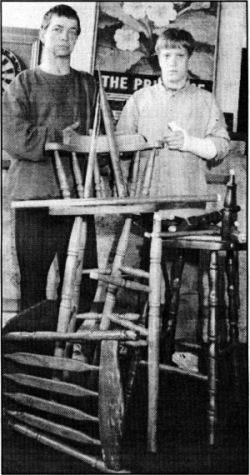 |
|
LANDLORD: Robert Mills and his son Nigel, injured
in the savage attack by bootlegging thugs. |
BOOTLEGGING MENACE FLARES UP IN BRUTAL PUB ATTACK
MP dreads thugs will stop at nothing to protect evil trade
A PUB landlord spent two days in hospital after he was savagely beaten by a
gang he claims are bootlegging and drug selling gangsters.
Robert Mills, 49, had a badly gashed head, needing 12 stitches, and two
broken ribs following the savage attack at the Primrose pub, in Coombe
Valley Road.
Trouble flared when he confronted the gang of four, thought to be from
Liverpool, over drug-pushing allegations. He warned them not to try it again
but they went berserk and one smashed him over the head with a pool cue.
He said: "I tried to retaliate and hit him back but before I knew it all
four men beat me over the head with their cues."
Outraged
As Mr Mills lay on the ground being kicked, his sons Robert, 28, and Nigel,
22, and Nigel's 17-year-old girlfriend, Sarah Bostock, tried to rescue him
but they were also attacked and injured.
One of the men used a metal stool to smash up the bar before the gang broke
down a door to escape.
Mr Mills was taken to Kent and Canterbury Hospital. His sons also suffered
cut heads.
Young Robert, who was at his dad's pub celebrating his engagement to Joanna,
had a broken nose and black eye.
Dover MP Gwyn Prosser is outraged at
the incident which he believes shows bootleggers are moving into drug
dealing.
He said: "Reports of violence and intimidation against pub landlords and
their families by bootlegging gangs are very worrying. This incident
reinforces my concern that bootleggers are selling drugs and will stop at
nothing to protect their evil trade."
Terror
Mr Prosser, who welcomes co-operation between police, customs and the
government to arrest the criminals, said: "Dover wants shot of these
people."
There was more terror next day when landlady Janet Mills got a phone call
from one of the gang, threatening to return and burn down the pub if they
went to the police.
Mr Mills said: "I've seen these four men around Dover but they're not local
and I couldn't name them. I know they're bootleggers but I think they're
moving away from that and on to bigger things.
He continued: "They're here to take over the drugs trade because they think
they're gangsters."
Nigel claims he was in the pub toilet last Saturday when one of the men
tried selling him speed.
"He had some pills in his hands but I told him I didn't want them."
A police spokesman said: "It's very easy to make assumptions about who is
committing crimes.
"But our job is to investigate them thoroughly. We will keep the people of
Dover updated through the media but we can't jump to conclusions."
|
|
From the Dover Mercury, 16 August, 2001.
Stabbing at pub
By SIMON FINLAY
Two in hospital after 'disturbances'
TWO people are recovering in hospital following alleged attacks at
separate addresses in Dover on Monday night. Police were called to an
incident following a disturbance at the Primrose pub in Coombe Valley
Road.
It is understood that a 20 year-old man suffered multiple stab wounds
during the incident and was rushed by ambulance to the Kent and
Canterbury Hospital.
A man was arrested and taken by detectives to Dover police station
shortly afterwards where he was held overnight.
The alleged victim is understood to have been stabbed three times in
the abdomen and suffered a cut to his neck. It is not known if any
charges are to be brought against the man in custody.
A police spokesman said: "man is in custody following an incident at
the Primrose public house on Monday night. I can confirm another male is
in hospital with wounds."
In another incident at an address in London Road, Dover, a man was
taken to the Kent and Canterbury Hospital with injuries to his head.
The alleged attack happened following what appears to have been an
argument at a flat and it is thought the injured man may have been
struck across the head with a heavy object.
Neighbours reported that they had earlier heard people coming and
going from the address and that there had been raised voices.
A police spokesman said: "We are looking into both matters and it is
a bit early in the investigation to draw conclusions."
|
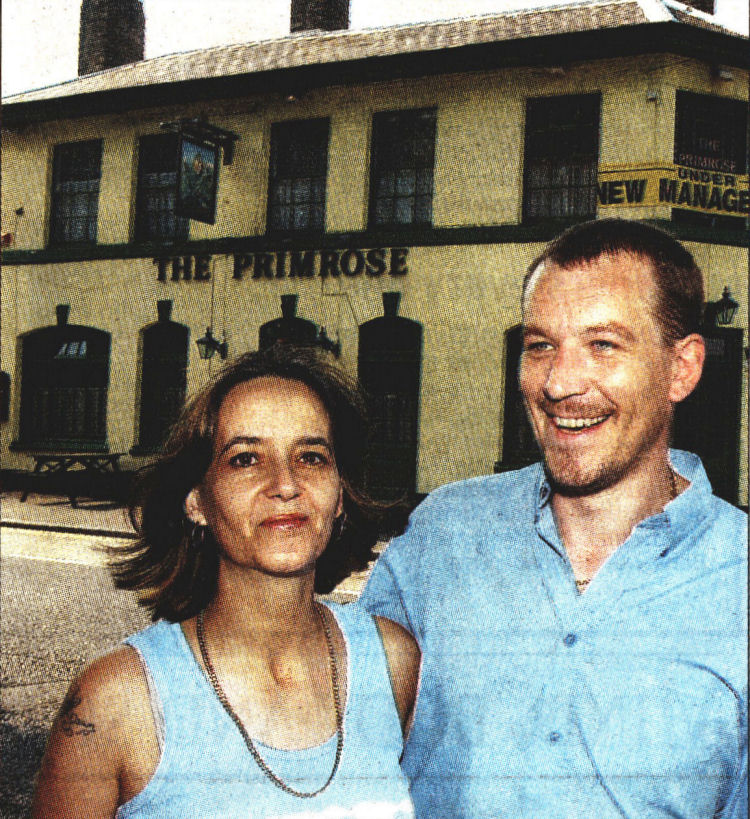 |
|
ONE FOR THE ROAD: New behind the bar at The Primrose pub, Dover;
ex-driving instructor Dawn Ripley and her husband Chris .Ref: pd 459390 |
|
Above picture and this article by Dover Mercury 14
August 2003.
Instructor is driven by new pub venture.
PULLING pints and helping people through their driving tests are
challenges Dawn Ripley meets with the same measure of calm. Earlier this
year she joined her husband Chris behind the bar of The Primrose Inn,
Coombe Valley Road, Dover, but for 11 years before that she was teaching
learners to drive.
She said: "I found the driving school was sending me the nervous ladies
and the older learners - I think it's because I'm' a good listener and I
brought up children before I learnt to drive myself.
"I taught the four oldest to drive and only one son failed to pass first
time - it was only a little thing - his position on the road."
Dawn herself passed first time and the youngest two of her six children
have a way to go before they claim L-plates James and Lauren are twins
of seven.
She said: "The oldest success I have had was a woman of 65, who, poor
love, was left by her husband and lived out in the country she'd never
sat behind a steering wheel in her life before."
Dover born and bred, Dawn went to Castlemount School, before heading to
Avo's factory in the town where she did soldering.
Then she saw an advert for driving instructors and decided to apply.
"I like people and working with people, and you can be flexible, but you
really do have to have a lot of knowledge," she said.
"Now it's a lot harder to learn to drive because conditions on the road
are harder.
"Some learners are quicker at the theoretical side and others pick up
the practical skills quicker." Once Dawn has helped steer The Primrose
on the road to stability she'll return to the world of beginners'
nerves, ground gears and sudden stalls.
It's easier than running a pub, she says.
|
|
All pictures below by Paul Skelton 10 August 2007 |
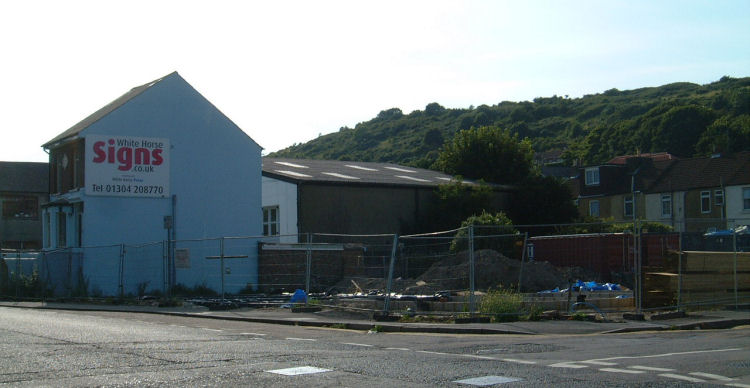 |
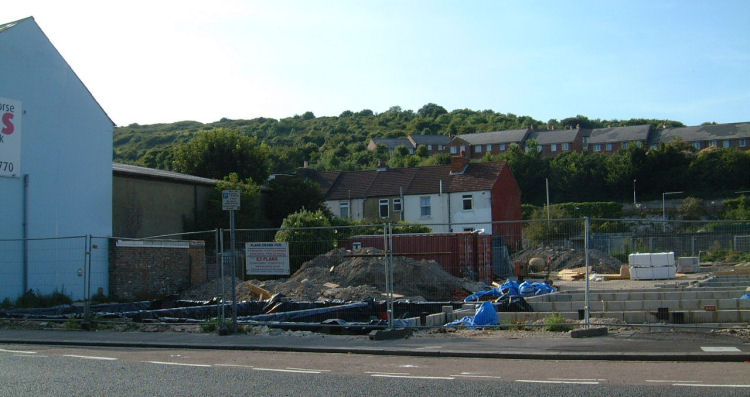 |
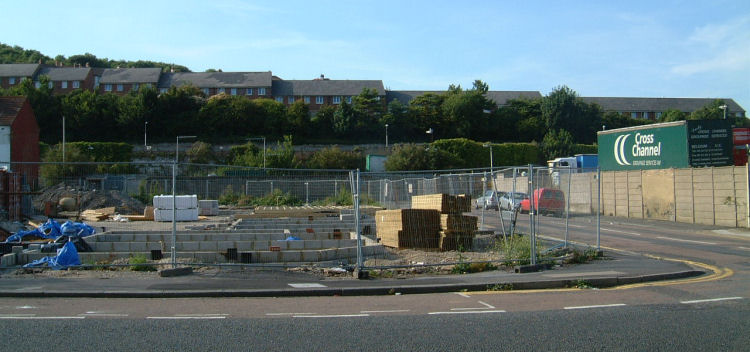 |
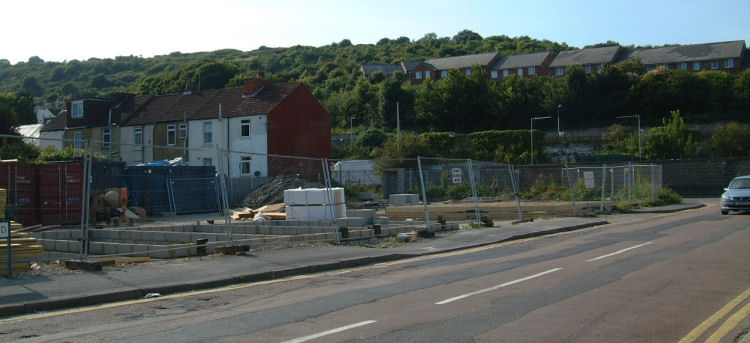 |
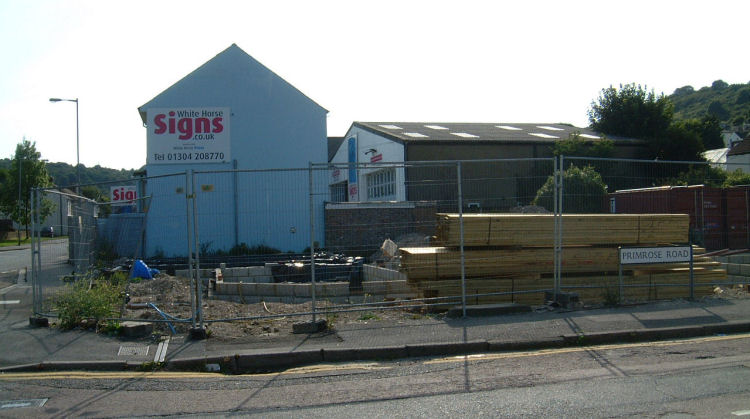 |
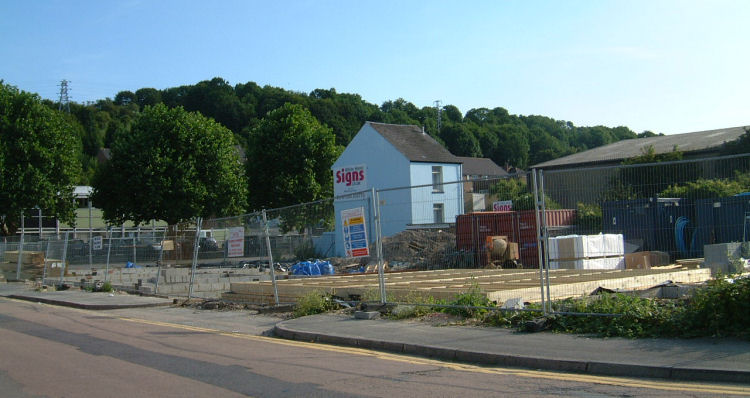 |
Closed in 2005 and demolished for rebuilding of flats in March 2007.
The only part of the premises still left, so Chris Grimes tells me, is
the doorstep that used to be used for entrance into the jug and bottle
entrance as shown below. The step is right on the corner of Coombe Valley
Road / Primrose Road.
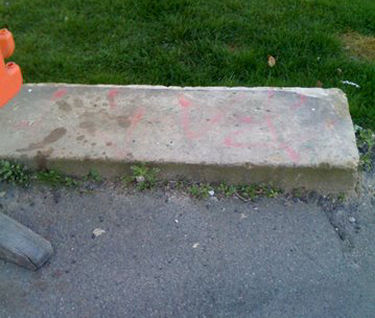
One last remnant has again been found by Chris Grimes, see below. It's
the boarding that used to welcome players to the skittle alley. Most of the
paint has been removed, but the outline of the welcome can just be seen.
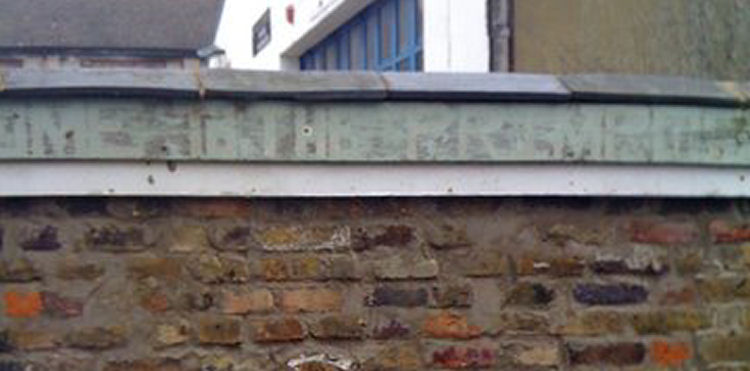
The original position can just be seen from the top two pictures shown on
the demolished site dated 10 August 2010. It would be nice to show the alley
as it was, if anyone should have a photo.
LICENSEE LIST
BROCKMAN David 1857-66+ (age 35 in 1861 ) )
PEIRCE James 1871-74-May/80 (age 54 in 1874 ) )

PIERCE Walter May/1880-82+
  (employee at Gas Works age 35 in 1881
(employee at Gas Works age 35 in 1881 ) )
 BEER Finnis William 1887-91+
BEER Finnis William 1887-91+

COURT John 1895-Dec/1902
     
 NORRIS William Dec/1902-04
NORRIS William Dec/1902-04

GOLDSACK John to Feb/1904

 CHAPMAN John Goldsack Feb/1904-07 end
CHAPMAN John Goldsack Feb/1904-07 end

NORRIS William 1907-Dec/15 dec'd (age 49 in 1911 ) )

NORRIS Mary Anne (widow) Dec/1915-Mar/31
   
 SIMMONDS William Mar/1931-38+
SIMMONDS William Mar/1931-38+
  
 CAIRNS James Robinson Aug/1941-44
CAIRNS James Robinson Aug/1941-44


CADMAN Ronald J R 1948-55 end
  
 BESSANT William T 1955-74 end
BESSANT William T 1955-74 end

ORGAN Anthony M (also "Prince
Regent") & BUTCHER R F D 1974
 Whitbread Fremlins
Whitbread Fremlins
STORER B 1974-75
McCLEOD or McLOUD Richard 1976
NAPIER Louis 1977-78 end
PEARSON Barry 1978-80 end
 BALSOM J 1980
BALSOM J 1980
BROWNING David 1980 end
GOODWIN Brian 1980-82 end
ROSE Barrie 1982-83 end
See "Strides"
McSLOY Norman 1985
THOMAS I 1985
DODD Peter 1988
MILLS Robert 1998
RIPLEY Chris 2003
 From the Post Office Directory 1874 From the Post Office Directory 1874
 From the Post Office Directory 1882 From the Post Office Directory 1882
 From Pikes Dover Blue Book 1895 From Pikes Dover Blue Book 1895
 From the Kelly's Directory 1899 From the Kelly's Directory 1899
 From the Post Office Directory 1901 From the Post Office Directory 1901
 From the Post Office Directory 1903 From the Post Office Directory 1903
 From the Kelly's Directory 1903 From the Kelly's Directory 1903
 From the Post Office Directory 1913 From the Post Office Directory 1913
 From the Post Office Directory 1922 From the Post Office Directory 1922
 From Pikes Dover Blue Book 1924 From Pikes Dover Blue Book 1924
 From the Post Office Directory 1930 From the Post Office Directory 1930
 From Pikes Dover Blue Book 1932-33 From Pikes Dover Blue Book 1932-33
 From the Post Office Directory 1938 From the Post Office Directory 1938
 From Pikes Dover Blue Book 1938-39 From Pikes Dover Blue Book 1938-39
 From Pikes Dover Blue Book 1948-49 From Pikes Dover Blue Book 1948-49
 From the Kelly's Directory 1950 From the Kelly's Directory 1950
 From the Kelly's Directory 1953 From the Kelly's Directory 1953
 From the Kelly's Directory 1956 From the Kelly's Directory 1956
 Library
archives 1974 Library
archives 1974
 From the Dover Express From the Dover Express
 Census Census
|
















